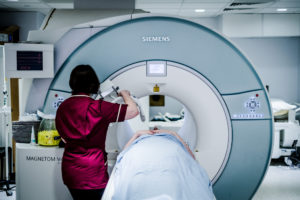 Researchers at Oxford’s John Radcliffe Hospital have used advanced magnetic resonance imaging (MRI) to investigate whether factors such as blood pressure, fitness, smoking and alcohol intake during young adult life are associated with changes in the blood vessels inside the brain.
Researchers at Oxford’s John Radcliffe Hospital have used advanced magnetic resonance imaging (MRI) to investigate whether factors such as blood pressure, fitness, smoking and alcohol intake during young adult life are associated with changes in the blood vessels inside the brain.
The University of Oxford researchers, supported by the NIHR Oxford Biomedical Research Centre, collaborated with researchers from Canada and the Universities of Bristol and London on the research, which was published on 21 August in the Journal of the American Medical Association.
The study, which was also funded by the British Heart Foundation and Wellcome Trust, took place at the Cardiovascular Clinical Research Facility at the John Radcliffe and involved 125 young adults between the ages of 18 and 40 years.
Participants with healthier cardiovascular risk profiles, such as those with optimal blood pressure who are following the UK’s Chief Medical Officers’ public health guidelines for exercise participation and lower alcohol intake were found to have higher density of blood vessels in the brain as well as higher brain blood flow and fewer white matter hyperintensity lesions, which have been associated with a higher risk of stroke and dementia in later life.
Professor Paul Leeson, Professor of Cardiovascular Medicine at the University of Oxford, who led the research, commented: “We have known for some time that lifestyle during young adult life is relevant to the health of the heart.
“This new research is exciting because we have been able to show that similar factors may also be impacting on the health of the brain, decades earlier than previously anticipated.”
Dr Wilby Williamson, Sports and Exercise Medicine Physician and Clinical Research Fellow in Cardiovascular Medicine at the University of Oxford, who helped deliver the study and is a co-author commented: “Young adult cardiovascular health is often a neglected area. This study is a first step towards personalised risk assessment so we can better inform people about steps to improve their future brain health.”
The study suggests that regular exercise, sensible drinking, not smoking and keeping blood pressure at healthy levels can have significant benefits for both heart and brain disease and that health choices have real impact and benefits at any age.
“It demonstrates the power and utility of medical imaging to better understand how specific risk factors relate to early brain changes,” said study co-author Dr Adam Lewandowski, who is funded by the Oxford BRC.
Professor Jeremy Pearson, associate medical director at the British Heart Foundation, said: “The risk of heart disease and stroke is known to be affected by external factors from early childhood onwards even though clinical events usually occur only in later life.
“This study in healthy young adults shows clearly that there are already detectable changes in blood vessels in the brain likely to increase risk of subsequent stroke in those with the highest level of modifiable risk factors such as smoking and high BMI. It strengthens the evidence that leading a lifestyle to keep your heart healthy is important throughout life.”
The research team are currently using the advanced imaging techniques available at the John Radcliffe in a trial in young adults with higher blood pressure. The study will help determine the best ways to change lifestyle to improve brain and heart health.